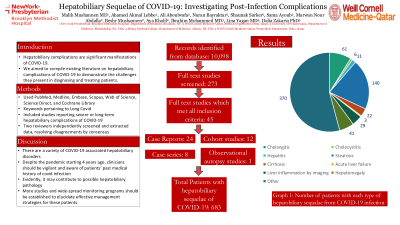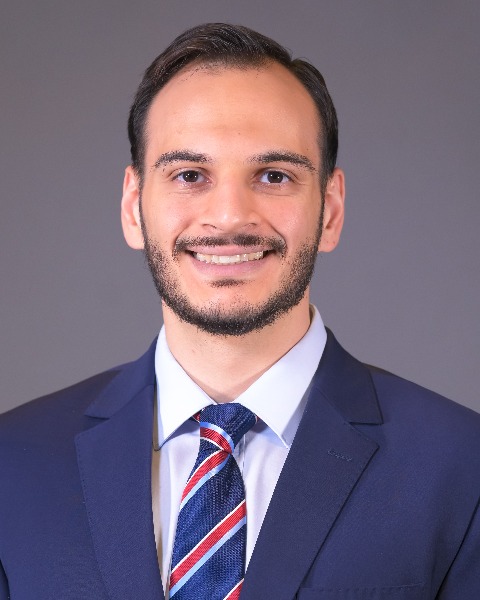Sunday Poster Session
Category: Liver
P1163 - Hepatobiliary Sequelae of COVID-19: Investigating Post-Infection Complications
Sunday, October 27, 2024
3:30 PM - 7:00 PM ET
Location: Exhibit Hall E

Has Audio

Malik Mushannen, MD
New York-Presbyterian / Brooklyn Methodist Hospital
Brooklyn, NY
Presenting Author(s)
Malik Mushannen, MD1, Ahamed Akmal Lebbe, 2, Ali Aboulwafa, 3, Nuran Bayraktar, 3, Shaunak Sarkar, 3, Sama Ayoub, 3, Marwan Abdalla, 3, Beshr Mushannen, 3, Aya Khalil, 3, Ibrahim Mohammed, MD4, Lina Yagan, MD5, Dalia Zakaria, PhD3
1New York-Presbyterian / Brooklyn Methodist Hospital, Brooklyn, NY; 2Weill Cornell Medicine-Qatar, New York, NY; 3Weill Cornell Medicine-Qatar, Doha, Ad Dawhah, Qatar; 4Albany Medical Center, Albany, NY; 5University of Pennsylvania, Philadelphia, PA
Introduction: Hepatobiliary complications are significant manifestations of COVID-19. These include hepatitis, cholangitis, and fulminant liver failure. This study aimed to compile existing literature on hepatobiliary complications of COVID-19 to demonstrate the challenges they present in diagnosing and treating patients.
Methods: In October 2023, we searched PubMed, Medline, Embase, Scopus, Web of Science, Science Direct, and Cochrane Library for studies using relevant keywords and controlled vocabulary that focused on “Long Covid” and variants. We included studies reporting severe or long-term hepatobiliary complications of COVID-19. Two reviewers independently screened and extracted data, resolving disagreements by consensus.
Results: We screened 10,098 studies and selected 273 for full-text review, ultimately including 45 that met our criteria, including 24 case reports, 8 case series,12 cohort studies, and 1 observational autopsy study. There were 161689 patients with COVID-19 infections, of which 683 developed hepatobiliary complications possibly related to COVID-19 infection. We distributed these patients into different categories: 61 patients with cholangitis, 1 patient with acalculous cholecystitis, 5 patients with choledocholithiasis, 11 patients with hepatitis, 140 patients with steatosis, 22 patients with cirrhosis, 3 patients with acute liver failure, 29 patients with liver inflammation by imaging, 41 patients with hepatomegaly, and 370 patients with unspecified hepatobiliary disease. Of these, 6 patients died.
Discussion: This study highlights the variety of COVID-19 associated hepatobilliary disorders 4 years after the COVID-19 pandemic began. Clinicians should be vigilant and aware of patients’ past medical history of covid infection, as it may be contributing to possible hepatobiliary pathology which is being worked up. More studies and wide-spread monitoring programs should be established to elucidate effective management strategies for these patients.
Disclosures:
Malik Mushannen, MD1, Ahamed Akmal Lebbe, 2, Ali Aboulwafa, 3, Nuran Bayraktar, 3, Shaunak Sarkar, 3, Sama Ayoub, 3, Marwan Abdalla, 3, Beshr Mushannen, 3, Aya Khalil, 3, Ibrahim Mohammed, MD4, Lina Yagan, MD5, Dalia Zakaria, PhD3. P1163 - Hepatobiliary Sequelae of COVID-19: Investigating Post-Infection Complications, ACG 2024 Annual Scientific Meeting Abstracts. Philadelphia, PA: American College of Gastroenterology.
1New York-Presbyterian / Brooklyn Methodist Hospital, Brooklyn, NY; 2Weill Cornell Medicine-Qatar, New York, NY; 3Weill Cornell Medicine-Qatar, Doha, Ad Dawhah, Qatar; 4Albany Medical Center, Albany, NY; 5University of Pennsylvania, Philadelphia, PA
Introduction: Hepatobiliary complications are significant manifestations of COVID-19. These include hepatitis, cholangitis, and fulminant liver failure. This study aimed to compile existing literature on hepatobiliary complications of COVID-19 to demonstrate the challenges they present in diagnosing and treating patients.
Methods: In October 2023, we searched PubMed, Medline, Embase, Scopus, Web of Science, Science Direct, and Cochrane Library for studies using relevant keywords and controlled vocabulary that focused on “Long Covid” and variants. We included studies reporting severe or long-term hepatobiliary complications of COVID-19. Two reviewers independently screened and extracted data, resolving disagreements by consensus.
Results: We screened 10,098 studies and selected 273 for full-text review, ultimately including 45 that met our criteria, including 24 case reports, 8 case series,12 cohort studies, and 1 observational autopsy study. There were 161689 patients with COVID-19 infections, of which 683 developed hepatobiliary complications possibly related to COVID-19 infection. We distributed these patients into different categories: 61 patients with cholangitis, 1 patient with acalculous cholecystitis, 5 patients with choledocholithiasis, 11 patients with hepatitis, 140 patients with steatosis, 22 patients with cirrhosis, 3 patients with acute liver failure, 29 patients with liver inflammation by imaging, 41 patients with hepatomegaly, and 370 patients with unspecified hepatobiliary disease. Of these, 6 patients died.
Discussion: This study highlights the variety of COVID-19 associated hepatobilliary disorders 4 years after the COVID-19 pandemic began. Clinicians should be vigilant and aware of patients’ past medical history of covid infection, as it may be contributing to possible hepatobiliary pathology which is being worked up. More studies and wide-spread monitoring programs should be established to elucidate effective management strategies for these patients.
Disclosures:
Malik Mushannen indicated no relevant financial relationships.
Ahamed Akmal Lebbe indicated no relevant financial relationships.
Ali Aboulwafa indicated no relevant financial relationships.
Nuran Bayraktar indicated no relevant financial relationships.
Shaunak Sarkar indicated no relevant financial relationships.
Sama Ayoub indicated no relevant financial relationships.
Marwan Abdalla indicated no relevant financial relationships.
Beshr Mushannen indicated no relevant financial relationships.
Aya Khalil indicated no relevant financial relationships.
Ibrahim Mohammed indicated no relevant financial relationships.
Lina Yagan indicated no relevant financial relationships.
Dalia Zakaria indicated no relevant financial relationships.
Malik Mushannen, MD1, Ahamed Akmal Lebbe, 2, Ali Aboulwafa, 3, Nuran Bayraktar, 3, Shaunak Sarkar, 3, Sama Ayoub, 3, Marwan Abdalla, 3, Beshr Mushannen, 3, Aya Khalil, 3, Ibrahim Mohammed, MD4, Lina Yagan, MD5, Dalia Zakaria, PhD3. P1163 - Hepatobiliary Sequelae of COVID-19: Investigating Post-Infection Complications, ACG 2024 Annual Scientific Meeting Abstracts. Philadelphia, PA: American College of Gastroenterology.

